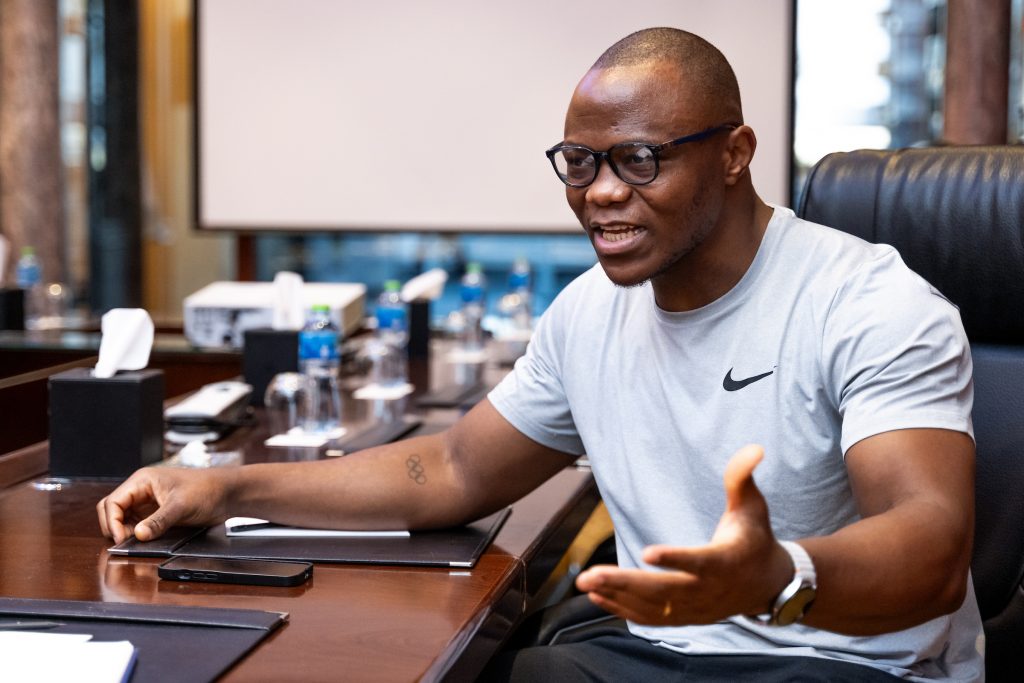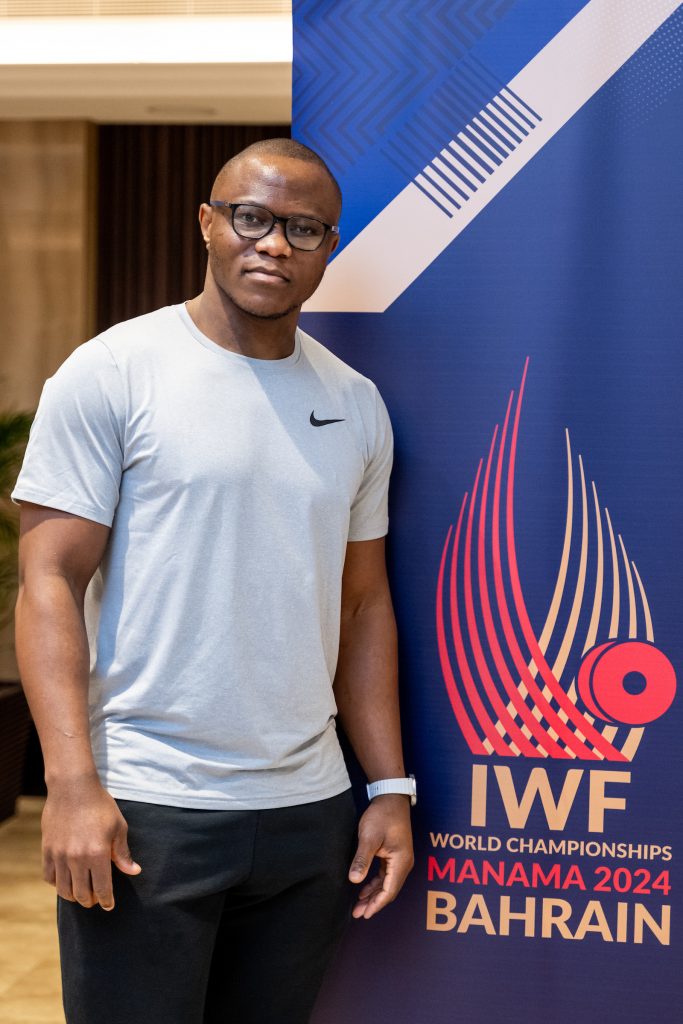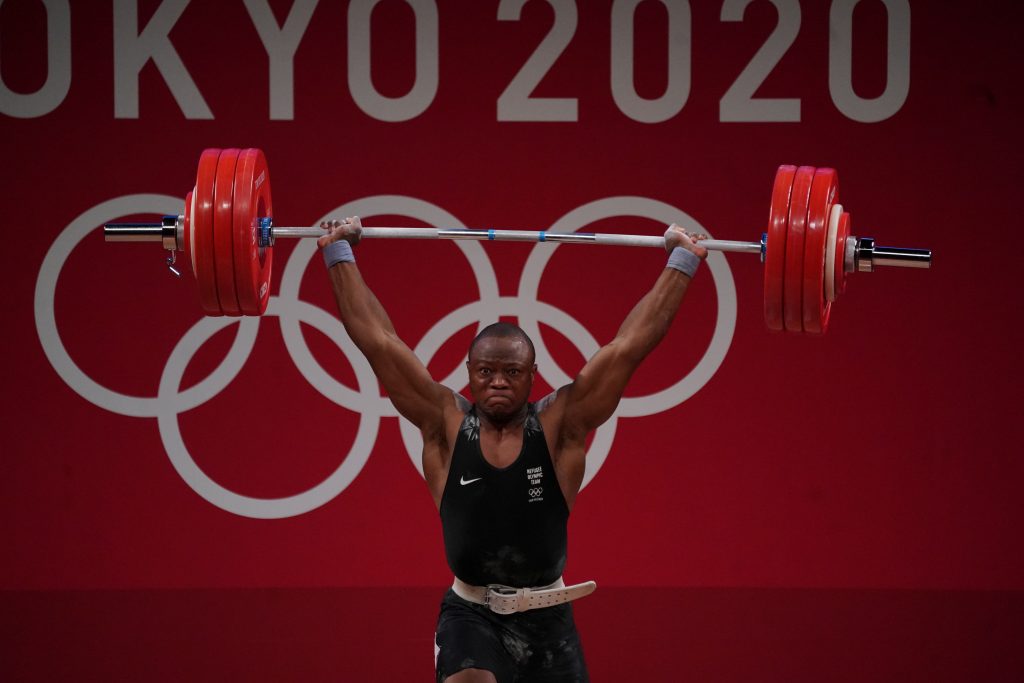His life could have been a book, but it almost became a movie. At the launch of the Paris 2024 Refugee Olympic Team, the International Olympic Committee produced an inspiring documentary about the journey of these athletes before and during the Tokyo 2020 Games. One of the stars featured was Cyrille Tchatchet, born and raised in Cameroon, then a refugee in England and now already a British citizen. He is in Manama, Bahrain, and will be an active spectator of the IWF World Championships starting this Friday. At the same time, we will also advocate for his latest endeavor – running for membership in the Athletes Council of the World Anti-Doping Agency (WADA).
“The idea of weightlifting came to me at the baptism of a cousin in Cameroon. During the celebration I saw a picture of his father (my uncle), a strength athlete, and I liked that picture so much that I decided to try it too.” recalls Cyrille, also a member of the IWF Athletes Commission. “But back then – I was only 14 – there weren’t many conditions to practice this sport. Still, I was strong – within a few months I was able to snatch 70kg… – and I started to achieve some encouraging results, both locally and nationally.”
 Cyrille Tchatchet: “Weightlifting is now a credible sport!”
Cyrille Tchatchet: “Weightlifting is now a credible sport!”
Then his life changed forever. In 2014, at the Commonwealth Games in Glasgow, he competed for his country but never returned home. “I felt it was no longer safe to come back. Given the distance and time, I think the decision was made too quickly without really thinking about the consequences.”
And these challenges were huge. “I had no acquaintances in the UK, no family, no friends, nothing. I ended up living on the streets and then being held in many immigration centers. There was a club in one of these places and I was able to train at some point… That saved me, but I had a very painful personal experience, especially from a psychological point of view.” Cyrille admits.
In 2016, his asylum application was finally accepted and he went to university to complete his studies. He always wanted to be a nurse and specialized in psychiatric nursing, which is now his main profession. “While I endured my difficult experience, I always had people who helped me, and so I felt that I wanted to help others too.”

In parallel, with a new status and residency in the UK, he could eventually gain membership to compete in British weightlifting events. Which he did, with remarkable success. In 2018, his efforts paid off and he was offered an IOC scholarship – which would be the first step towards his place on the Olympic Refugee Team.
2020 meant a global COVID pandemic and the Tokyo Games had to be postponed. “To be honest, it served my interests quite well. At that point I suffered a hip injury and the extra year before the Olympics was valuable in helping me fully recover.” Cyril remembers. When the team is formalized, he is happy to learn that he will be in the Japanese capital to take part in the most important sporting event in the world. “It was surreal, a kind of dream. Every athlete trains with the ultimate goal of competing in the Olympics, but given my history and the complicated circumstances in which I lived, imagining competing in the Olympics was completely unthinkable. But I was there and it was great, despite the COVID restrictions. Competition day came and I managed 155-195, which was a little below my best expectations, but still pretty good considering my injury. “I also had problems with my elbow during the snatch, so I couldn’t do the clean shot under the best possible conditions.”
 Participation in the Olympic Games in Tokyo
Participation in the Olympic Games in Tokyo
After Tokyo and already with a university degree under his belt, Cyrille begins working as a psychiatric nurse in the community, alternating his duties between a medical facility and home visits to patients who need his help. In the sports field, he continues training and takes part in the 2022 Commonwealth Games, where he lifts a very good snatch of 158 kg, but then misses the clean and jerk part. He is fourth (156-194-350) in the 96 kg bodyweight class at the 2023 European Championships.
“My goal is to compete at the 2026 Commonwealth Games and win a medal there. Since they are also in Glasgow, it would be a good way to somehow close the circle since 2014.” he admits.
 “It is important that our voice and representation become stronger”
“It is important that our voice and representation become stronger”
Cyrille was nominated for membership in the WADA Athletes Council by the Chairman of the IWF Athletes Commission, Forrester Osei, on behalf of our international federation and sincerely believes that he has the legitimacy to advocate for it: “There has been a profound cultural change in weightlifting in recent years. The dark times that we have experienced in the past, particularly in relation to doping cases, are now over. Our sport has gained credibility and our athletes feel like they can take part in an event and compete fairly with the others.” Cyril explains.
In addition, due to his work in the healthcare industry, the successful strength athlete is convinced that he can add value to the WADA Council. “The voice and representation of athletes has become stronger over the years. This is important. With my background in both mental health and elite sport, I think I can combine this for the benefit of WADA. The circumstances of my life have made me a strong and resilient person, not only in competition but also off the platform. This is important for any job or venture you take on in your life!” Cyrille concludes.
Pedro Adrega
IMF communication
